FOOD SECURITY & QUICK RESPONSE PROGRAM
Caritas Ukraine’s emergency response encompasses all aspects of meeting the basic needs of vulnerable populations affected by the war. Since 2014, Ukraine has been enduring a humanitarian crisis that escalated dramatically with the full-scale invasion in 2022, now recognized as a multi-sectoral humanitarian crisis. Constant attacks on critical infrastructure, residential buildings, and efforts by Russian forces to deprive cities of essential services and erase entire settlements have led to severe consequences.
According to estimates of the United Nations Office for the Coordination of Humanitarian Affairs, as a result of military operations, about 40% of Ukrainians need humanitarian assistance. This is more than 14.6 million people.
Food Security & Quick Response
Goal: promptly provide the most needed assistance, including ensuring access to food for those most in need, and creating capabilities for rapid response to humanitarian crises.
Key directions and services
– Hot Meal
– Food Kits
– Rapid Response Kits
– Creation of Quick Response Points (temporary shelters)
– Rapid response to humanitarian challenges
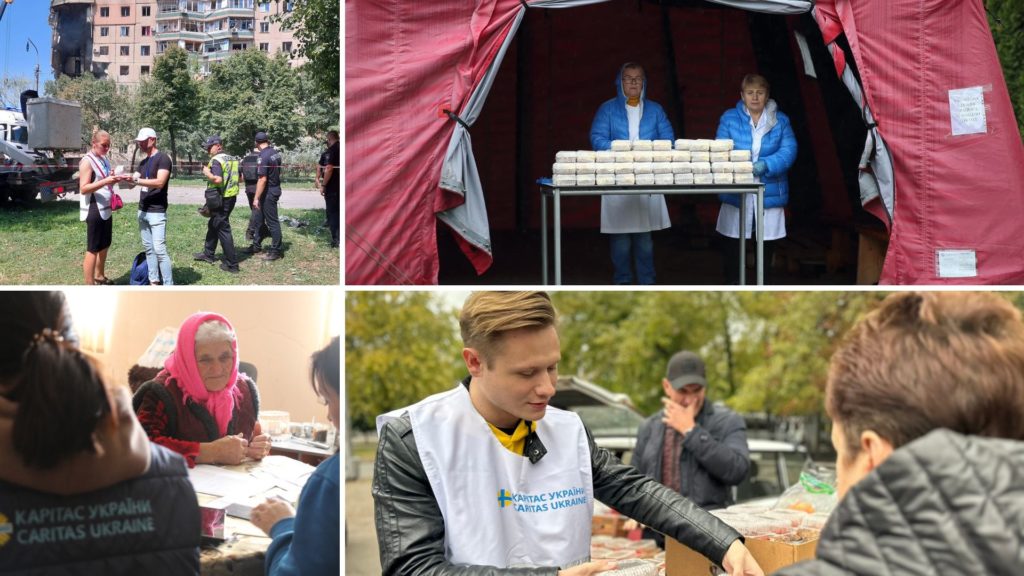
During a humanitarian crisis or response efforts, Caritas Ukraine employs three primary modalities for distributing humanitarian aid:
In-kind Modality:
The in-kind modality is implemented according to the initial intervention procedure using specially adapted kits designed to support individuals during crisis situations.
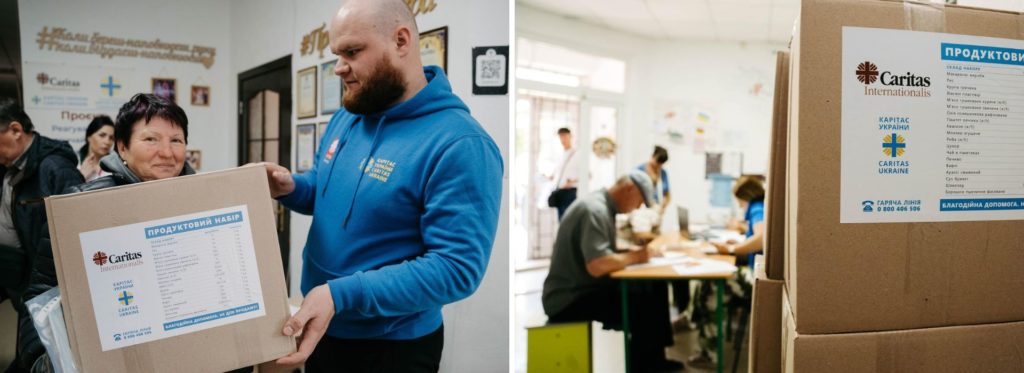
There are three categories of people who require in-kind assistance:
– People with limited mobility
– People in transit
– People with limited access to markets and infrastructure (such as water and electricity supply)
For these groups, we have developed new types of kits tailored to their specific needs.
Personalized Targeted Assistance through Food E-Cards:
This system ensures accountability and guarantees that funds are spent as intended. It is implemented in areas where infrastructure and market access are available. Beneficiaries receive electronic cards for food purchases, allowing them to meet their nutritional needs while ensuring transparency and proper use of resources.
This modality is one of the most effective ways to support beneficiaries, especially during evacuation scenarios. It provides flexibility, allowing individuals to address their specific needs, which may vary widely. For instance, someone might need a phone they lost during a missile strike, while others may require specialized hygiene products or medications. This approach moves away from a one-size-fits-all model and empowers individuals to use the assistance in the most beneficial way for their circumstances.
Emergency Appeal 2024
Thanks to the consolidation of the global community, for the past three years, the Emergency Appeal project has been helping us respond to challenges effectively and promptly.
The project’s uniqueness lies in its flexibility. We collect donations into a so-called general fund, from which we direct funding and resources to urgent needs.
The emergency response component is integral to Caritas Ukraine’s programs in WASH (Water, Sanitation, and Hygiene), Shelter, Protection, Livelihood, and Food Security. Emergency Appeal — it is a multidisciplinary project that has become a lifeline for over two million beneficiaries over the past two years.
This year and in the coming years, Emergency Appeal is focusing on frontline and border areas, as well as two central regions that serve as humanitarian hubs due to the significant influx of evacuees. The flexibility and extensive support of the project enable us to swiftly respond to emerging challenges and provide timely, essential aid.
Key areas Emergency Appeal in 2024:
Food Security
– hot meals
– food kits
– cash for work
WASH
– safe water
– hygiene assistance (kits)
Shelter
– camp management services
– emergency shelter kits
– child-friendly spaces
– NFI kits
– light repairs
– solid fuel for heating
– generators
Protection & Education
– crisis centers (comprehensive support: counseling, case management, psychological support, legal advice)
– psychosocial support, educational and child protection services
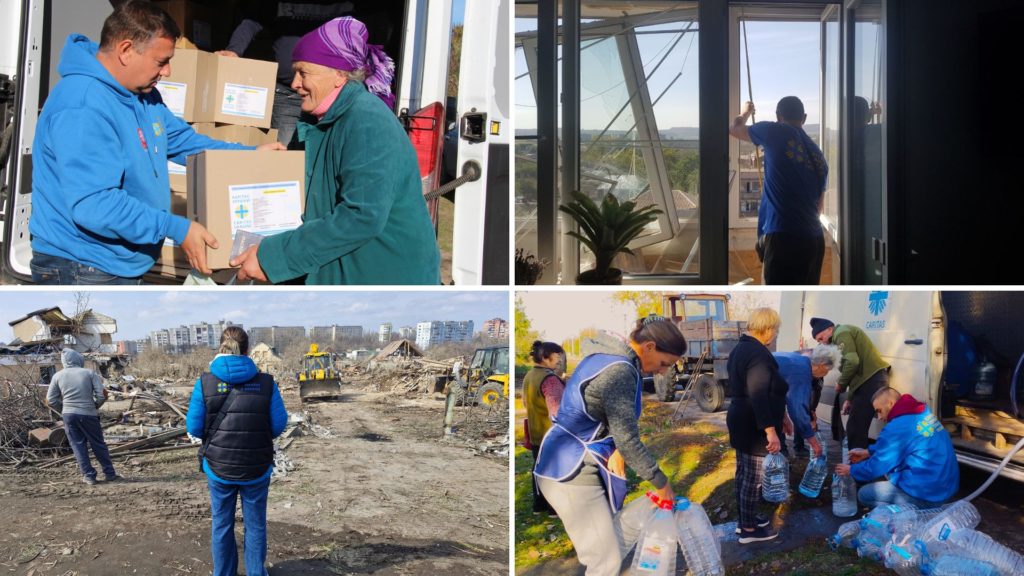
It is important that the project also focuses on vulnerable groups. Special support and attention are given to children, people with disabilities, large families, the elderly, and internally displaced persons.
Unique expertise and leadership
Caritas Ukraine works closely with government authorities, local self-government, and other humanitarian organizations. Our program representatives are actively involved in WASH, Shelter, and Food Security clusters, as well as in rapid response teams. We are expanding our collaboration as a key organization that has been, is, and will continue to be a leader in humanitarian response in Ukraine.
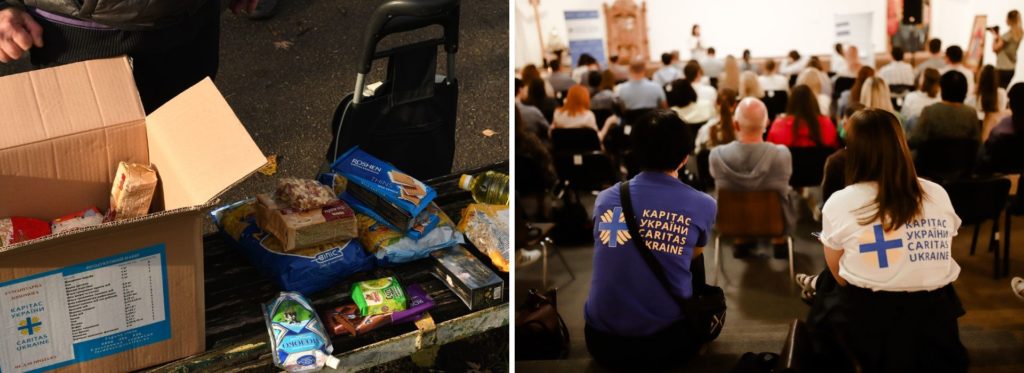
Today, Caritas Ukraine is spearheading two critical initiatives:
1. Development of SOP for Hot Meals:
We have developed Standard Operating Procedures (SOP) for hot meals, which we are currently coordinating with the Food Security cluster for all contractors. This initiative addresses a pressing issue: many organizations often neglect sanitation and hygiene requirements, which we cannot allow. Our SOP aims to ensure that all hot meal distributions meet the highest standards of safety and hygiene.
2. Joint Emergency Response Protocol:
In June 2024, we brought together international and national humanitarian organizations, two clusters (Food Security and Quick Response), state institutions, and police authorities to form an effective emergency response protocol. This group aims to establish clear guidelines for humanitarian access, ensuring smooth interaction and coordination with the State Emergency Service of Ukraine, police, and government institutions. We aim to create a safe and standardized humanitarian access framework that protects volunteers and organization specialists during their operations.
By leading these initiatives, Caritas Ukraine sets new standards in humanitarian response, ensuring that aid is delivered safely, effectively, and coordinated. Our collaboration with various stakeholders strengthens our capacity to address the urgent needs of vulnerable populations and enhances our role as a leader in the humanitarian sector.
New challenges
Quick response is an inherently unpredictable activity, driven more by reacting to unfolding events than by planned actions. The ongoing war has led to a growing number of challenges.
The most urgent challenges at the moment are challenges related to the coming winter.
On January 2024, residents of the village of Kiselyvka, Mykolaiv Oblast, received another batch of firewood. In total, more than 50 cubic meters of firewood were unloaded from one truck. They were divided into eight local families – each with 6.7 cubic meters.
Lyudmila, a resident of Kiselyvka, received six cubes of firewood. According to her, there is still no gas supply in the village, the systems were damaged due to shelling. The house is heated with a stove twice a day.
Lyudmila says: “I think we will have enough firewood until the end of winter. Winter is not so cold. We hope that it will be enough because it is tough to live this winter without gas.”
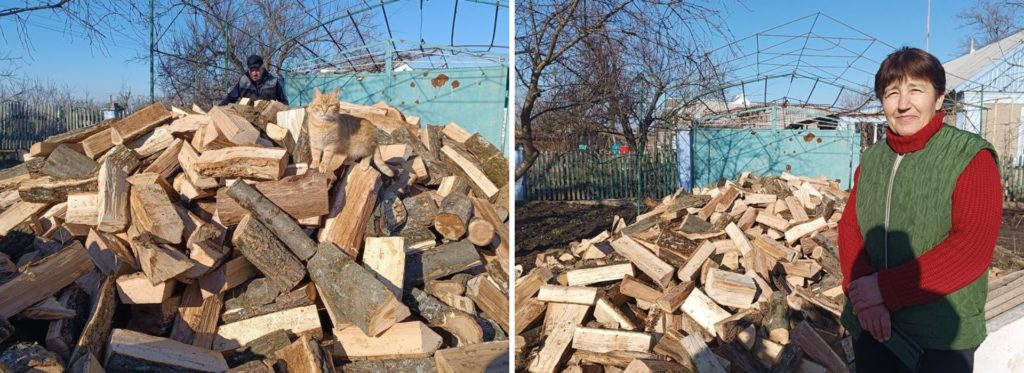
To address these urgent needs within the framework of our emergency response, we must focus on the following priorities:
1. Winterization:
Due to significant damage to thermal power plants, there have been ongoing power outages since the summer. This situation is expected to worsen during the winter. Ensuring access to fuel materials for heating is crucial to help people survive the harsh winter conditions. Providing fuel for heating becomes essential to prevent a severe humanitarian crisis during the cold months.
2. Food Security:
We need to provide unspecialized cash assistance in locations where there are logistical and market capacities. This approach not only supports local businesses but also frees up our workforce to address other urgent emergency response needs. Additionally, we have prepared food kits that do not require electricity or gas for cooking, ensuring that even those without access to these utilities can still have access to food.
3. Support for Points of Invincibility:
These are open tent shelters where people can spend time during power outages. Support is needed to provide heating and hot meals for vulnerable populations at these shelters. Ensuring these points are adequately equipped and maintained will help people stay warm and nourished during prolonged periods without electricity.
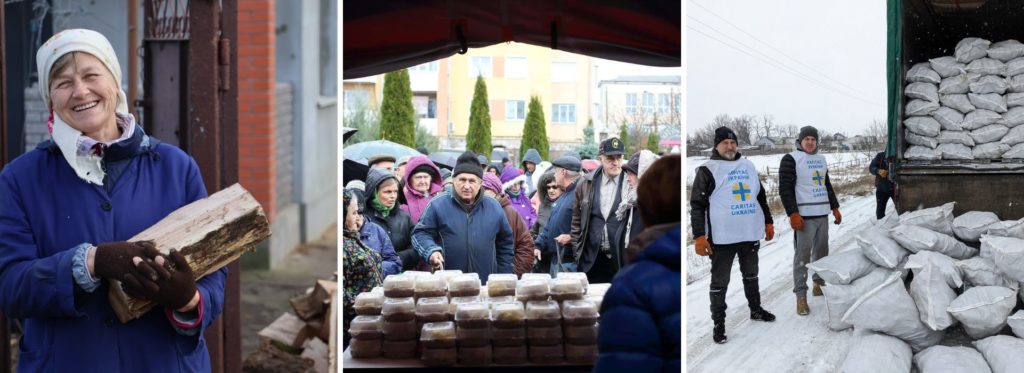
By focusing on these urgent needs, Caritas Ukraine aims to mitigate the impact of the winter season and ongoing war on the most vulnerable populations. Immediate and coordinated efforts are essential to provide the necessary support and resources to those in need.
Khmelnytskyi
- Daily dynamics of shelling
- Significant damage despite not being in the immediate humanitarian response zone due to distance from the front
The Need for Support
The humanitarian crisis in Ukraine is intensifying, necessitating the solidarity of the international community in supporting the Emergency Appeal project. As of mid-2024, this critical initiative has received only 20% of its required funding, with an additional 30% still in the pledge stage. We are currently striving to secure the remaining half of the total budget.
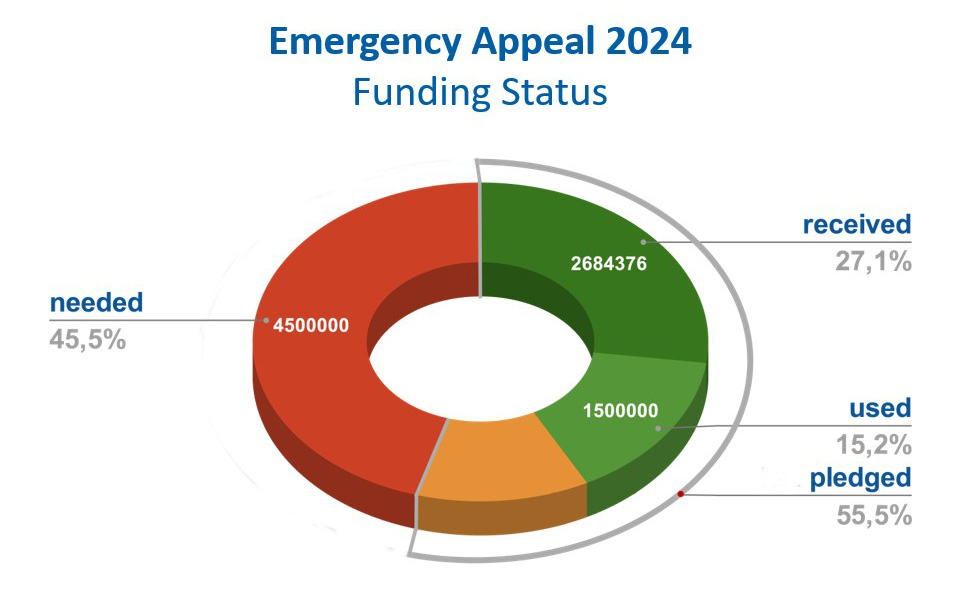
We urge the global community to stand with us in these challenging times and contribute to our efforts to bring relief and hope to those suffering in Ukraine. Your support can make a significant difference in the lives of countless individuals.
Regional Humanitarian Challenges in Ukraine
Sumy
- Displacement of immobile individuals (people with disabilities)
- Damaged logistical routes cut off communities from stable supplies of food and hygiene products
- Damage to power generation facilities leads to water supply interruptions, filtration issues, and complicates food production processes
- Escalation of hostilities (massive enemy troop buildup worsens the situation in Sumy and damages transport routes between Sumy and Kharkiv)
- Children from rural areas evacuated to medical facilities in the region require psychological rehabilitation
Kharkiv
- Escalation of hostilities
- Kharkiv, which is more intensively shelled (hospitals, shelters, humanitarian centers are targets)
- Threat of deteriorating transport links, complete loss of electricity and water supply, and lack of communication
- Large number of mobile people needing evacuation
Luhansk
- Absence of gas supply, electricity, and access to markets or forests for fuel
- Intense hostilities across the entire region
- Limited humanitarian access — lack of safe routes
Donetsk
- Escalation of hostilities
- Municipal authorities need help with evacuations
- Lack of water supply, especially in large cities
- Constant shelling of social infrastructure
- Lack of heating and gas supply
Zaporizhzhia
- High risk of shelling of social infrastructure and shelters, hindering transit accommodation
- Damaged water supply due to continuous strikes on the Zaporizhzhia HPP
- Systematic destruction of life-sustaining infrastructure
Kherson
- Constantly under shelling, high-risk area
- Absence of electricity and communication
- Need for evacuation
Mykolaiv
- Water supply shortage caused by the Kakhovka reservoir explosion
- Social facilities require restoration
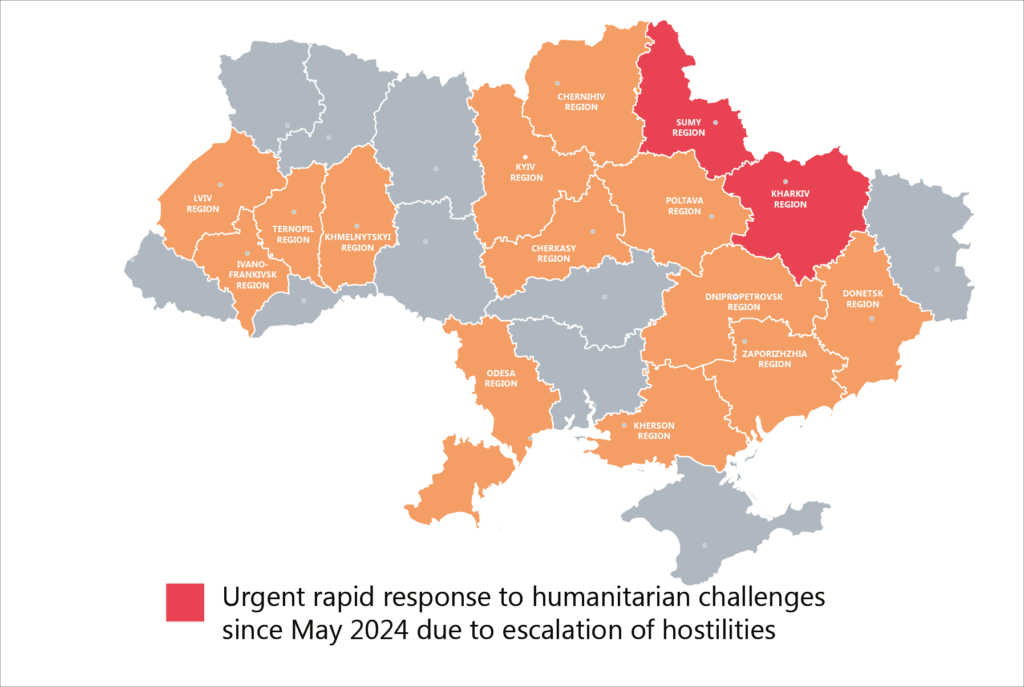
Dnipro
- Continuous shelling
- Systematic destruction of essential city infrastructure
- Damage to infrastructure: heating and power plants, hospitals
- Absence of electricity and water supply in cities close to the front line (Nikopol and Marganets)
Kropyvnytskyi
- Lack of developed infrastructure for IDP accommodation
- Unfavorable economic situation
- Absence of social service infrastructure in small towns
Vinnytsia, Zhytomyr, Kyiv
- Large influx of IDPs
- Integration of IDPs (need for psychological and legal services)
Chernihiv
- Complicated logistics due to damaged transport routes
- Threat of hostilities leading to forced evacuation from the 5km zone
- Targeted shelling of border areas and the need for temporary accommodation arrangements
Poltava
- Transit point for evacuation from Kharkiv, Sumy, and Donetsk regions
- Challenge — overfilled temporary accommodation facilities and their maintenance
- Integration of IDPs (need for psychological and legal services)
- Damage to oil refineries leads to fuel shortages and lack of electricity
Odesa
- Constant shelling of social infrastructure
- Damage to part of the bridge connecting Odesa region with the rest of Ukraine via Moldova
- Problems with power generation
Khmelnytskyi
- Significant damage despite not being in the immediate humanitarian response zone due to distance from the front
- Daily dynamics of shelling
Support Ukrainians, who have become the shield for the civilized world against the Russian onslaught




